Talent Assessment Platform
Assess candidates. Develop employees. Benchmark performers. Identify leaders.
Use predictive behavioral assessments to measure leadership, managerial and individual potential. Gyfted's talent development assessment tools give talent managers insights into individual and team strengths.

Easy to use, cutting edge assessments
Do not pay per test-taker or per assessment to get full assessment value: assess all your people, benchmark any team, create HiPo and culture champion benchmarks.
Cutting edge assessments with feedback to build self-awareness
Stop paying per test! Use assessments flexibly for everyone in your organization
Customizable tests to give you the metrics you're looking for
Used by growth companies and global brands
Use behavioral and psychometric tools to identify, develop and retain talent
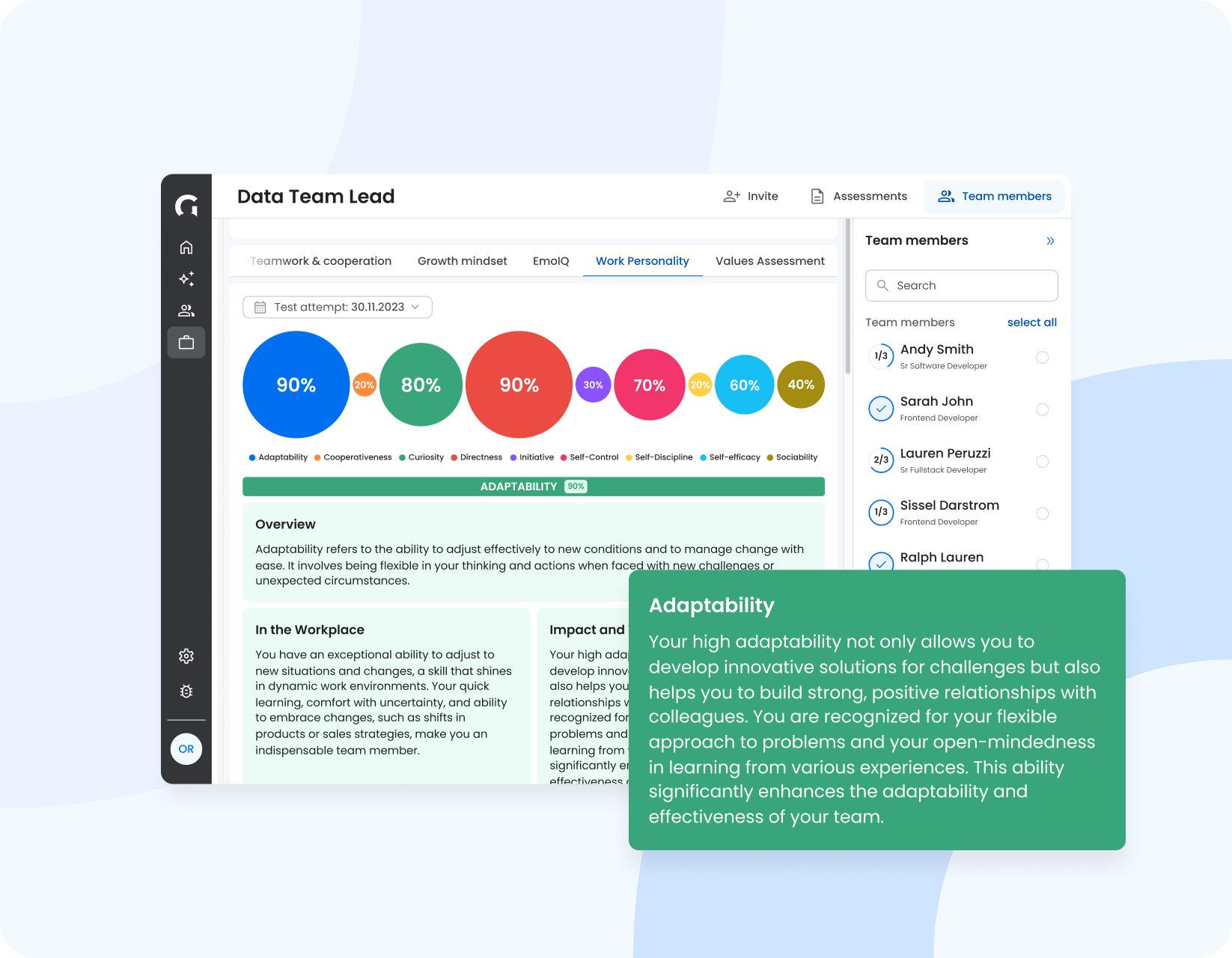
Benchmark Talent
Measure and benchmark your leaders, managers and high performers. Discover the personal drivers and traits that lead to performance. Hire and promote against your benchmarks.
Learning Agility
Test anyone’s adaptability and learning inclination to get a sense of their growth mindset.
Work Strengths
Discover and measure character and personality strengths to figure out role fit, promotion plans and improve internal talent mobility.
How it works
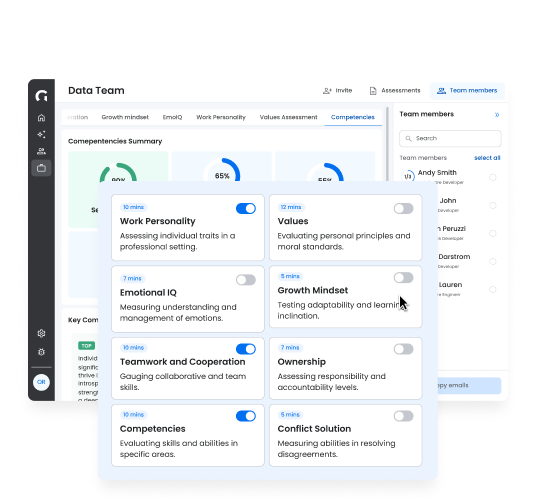
Pick your desired talent measurement modules
Gyfted’s talent insights platform is designed to facilitate more informed decision-making in human resources, focusing on optimizing team dynamics and individual performance potential. Pick and choose what assessment tools you need to realize your talent management needs. If you need something else - talk to us.
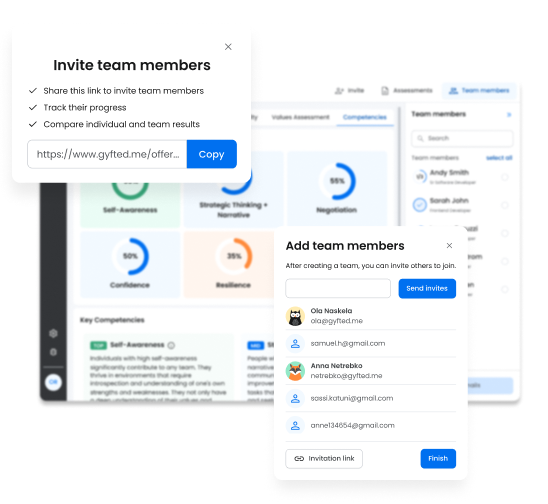
One click to share with individuals and your team
One click sharing is easy. Stop wasting time on trait and scale development - we know it. Focus on distributing and encouraging your organization to engage in your talent development initiatives.
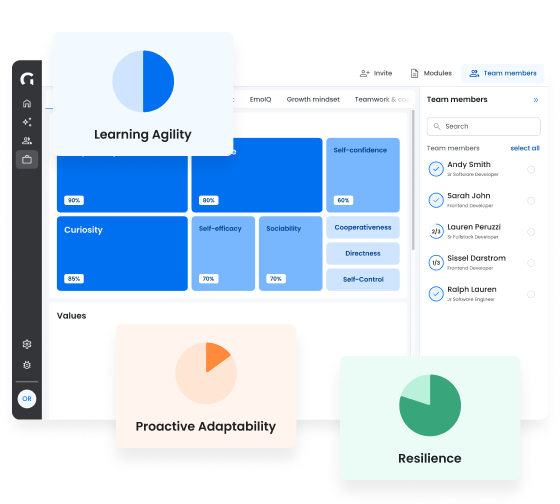
Gain insights into your team and high performers
Examine the intricacies of your team and individual work styles to get actionable insights into optimizing team performance. Understand diverse work styles, problem-solving approaches and individual motivators. Such insights help managers align teams with performance goals.
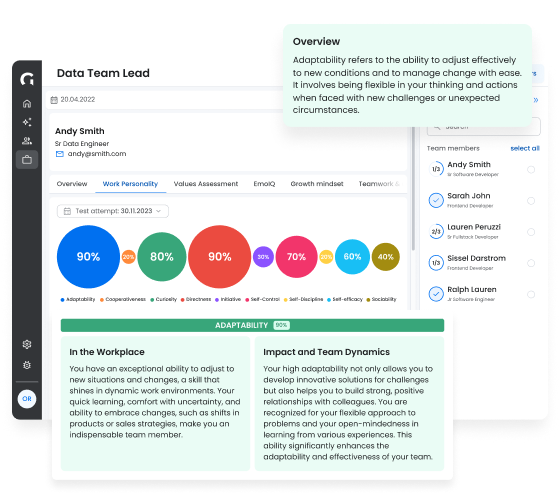
Insights and career tips to retain talent and uncover future leaders
Talent Insights is transforming the process of identifying future leaders by integrating artificial intelligence and behavioral analysis into talent management strategies. This approach provides a nuanced understanding of employees’ leadership potential, emphasizing attributes such as strategic thinking, emotional intelligence, and adaptability. By applying these insights, organizations can more accurately identify and develop individuals with inherent leadership qualities.
Available core talent assessments
Culture and Personality
Develop people and teams based on their strengths and preferences.
Develop people and teams based on their strengths and preferences.
Conflict Style
Effectively resolve conflicts by identifying individual conflict resolution styles.
Effectively resolve conflicts by identifying individual conflict resolution styles.
Growth Mindset
Foster proactivity and resilience by identifying attitudes.
Foster proactivity and resilience by identifying attitudes.
Emotional Intelligence
Improve team collaboration by measuring empathy and emotion management.
Improve team collaboration by measuring empathy and emotion management.
Personal Values
Align your people and teams by understanding your shared values.
Align your people and teams by understanding your shared values.
Cognitive Ability
Discover and promote high potential individual contributors.
Discover and promote high potential individual contributors.
Manage talent using behavioral science
Managing talent using behavioral science is about leveraging data-driven insights to understand individual and team dynamics, improve hiring accuracy, and enhance employee engagement. By incorporating psychometrics, computer adaptive testing, and machine learning, Gyfted’s platform offers a comprehensive approach to matching candidates’ abilities, competencies, personalities, and cultural fit with the right roles, leading to more effective and unbiased recruitment processes.
Use data-driven talent development insights to build strong teams
Testimonials 🥰
Adam
Global Group Director
A great team! They’re the fastest assessment and recruitment team we’ve worked with thus far. Gyfted’s talent solutions are helping us improve our internal talent mobility and go beyond pure external recruitment efforts.
LSEG Case Study
Anastasiia
Talent Development Manager
This is the nicest UX design I’ve ever gone through on an assessment tool. Gyfted’s team are super responsive, helpful, they care about customer success and have helped us spearhead our enterprise-wide talent development initiatives.
EPAM Case Study
Our Experts
1. Blaze Mrozinski, CPO - SWPS, London School of Economics
2. Alina Shabatov, Sr Psychometrician - Bar-Ilan, Cambridge
Frequently asked questions
What is talent strategy?
Talent strategy refers to a company's plan to effectively attract, manage, develop, and retain talented employees to achieve its business goals and gain a competitive advantage. A successful talent strategy is aligned with the company's overall business strategy and adapts to changing market conditions, technological advancements, and evolving workforce expectations. It's a comprehensive approach to managing human capital, ensuring that a company has a capable, motivated, and engaged workforce to drive business success.
It can encompass various HR management practices and processes, including:
- Talent Acquisition strategies to attract and recruit the best talent, often utilizing targeted job advertising, engaging job descriptions, and efficient recruitment processes.
- Employee Development via training and development programs to enhance employees' skills and knowledge.
- Performance Management systems to evaluate and manage employee performance, aligning individual goals with the company's objectives, and providing feedback and support for improvement.
- Retention Strategies the create an environment that encourages talented employees to remain with the organization, eg. competitive compensation, career advancement opportunities, a positive work culture, work-life balance initiatives.
- Succession Planning that prepares for future leadership needs by identifying and developing internal candidates with the potential to fill key business leadership positions.
- Workforce Planning capabilities, identifying future needs, and planning accordingly to ensure the company has the right mix of skills and talent.
- Employer Branding that appeals to potential and current employees, highlighting the company's values, culture, and benefits.
Are Talent Insights objective?
Gyfted creates state-of-the-art tools for organizations and talent management professionals based on sound psychometric, occupational psychology and behavioral science and empirical proof. Our approach is crafted to offer a nuanced understanding of talent dynamics within your organization.
We consciously steer away from traditional Likert-type scales in our assessment methodologies. Our rationale is to minimize social desirability bias, a common challenge in self-reported measures, which can skew results and hinder accurate talent assessment. Instead, we utilize more sophisticated response options, such as ranking and forced-choice formats. These methods are more effective in eliciting genuine responses and provide a clearer, more accurate reflection of an individual's capabilities and traits.
In our toolkit, we integrate acclaimed models and theories that have proven effective in understanding human behavior and professional competencies. A cornerstone of our approach is the Five Factor Model (FFM) of personality, which offers a comprehensive framework for understanding key personality traits. This model is instrumental in predicting job performance and cultural fit. Additionally, we incorporate Schwartz's Theory of Basic Values, a profound tool in understanding an individual's value system, which is critical in aligning personal values with organizational goals.
We leverage Goleman’s Emotional Intelligence framework, recognizing the vital role of emotional competencies in workplace success. Emotional intelligence is a key predictor of performance, leadership potential, and collaboration effectiveness. By integrating this framework, we provide insights into how individuals manage emotions, navigate social complexities, and make decisions, which are crucial skills in today’s fast-paced work environment.
Our methodologies are enriched by a Competencies Graph (a skills graph ontology) that embeds O*Net’s extensive occupational database. This integration allows us to provide detailed insights into various occupational requirements and competencies, aiding in effective job-role mapping and talent alignment.
Our approach is not just theoretical but highly practical and tailored to meet the strategic and day-to-day talent development needs of your organization. We invite you to contact us for a comprehensive walkthrough of our offerings. This will enable us to demonstrate how our tools and methodologies align with your specific talent management objectives, helping to foster a culture of excellence and growth within your enterprise.
What is talent development in HR?
Talent development in Human Resources (HR) is a strategic process focused on identifying, nurturing, and advancing the skills and capabilities of employees to meet current and future org needs. Talent development is essential for creating a skilled and adaptable workforce, fostering employee engagement and satisfaction, and ensuring the organization has the talent needed to achieve its strategic objectives. It's a key component of talent management and involves various initiatives and strategies to foster employee growth and development like these below:
- Employee Training and Education: on-the-job training, workshops, seminars, conferences, e-learning, and professional development courses.
- Career Development: career pathing, mentoring programs, and guidance.
- Leadership Development: targeted training programs, mentorship, and opportunities to take on challenging roles or projects.
- Succession Planning for future leadership or critical roles by identifying and developing internal talent with the potential to fill these positions for business continuity.
- Performance Management via assessing employee performance and providing feedback to guide their development.
- Employee Engagement and Retention strategies to keep employees engaged and motivated, which is crucial for their ongoing development.
- Skills Gap Analysis within the organization alongside developing strategies to address these gaps through targeted development initiatives.
What is a talent management system?
A talent management system is an integrated software solution used by organizations to effectively manage the entire employee lifecycle. This system encompasses various talent functions and leverages principles from psychometrics, behavioral science, and assessments to identify and nurture employee potential. Key components include:
- Psychometrics utilize psychological assessments to understand employee personalities, strengths, and areas for development by conducting ability, skill and competency evaluations to inform training and development needs.
- Evaluation regularly assesses employee performance, aligning their contributions with organizational goals.
- Behavioral Science applies behavioral insights to understand and improve employee engagement and productivity.
- Promotion manages the process of advancing employees to higher roles based on their performance and potential.
- Managerial Talent Development - focuses on building the skills necessary for effective management roles.
- Leadership Development - cultivates leadership qualities in employees for strategic roles within the organization.
- Learning and Development (L&D) programs and initiatives designed to educate and train employees for improved performance and career progression.
- High-Potential (HiPo) Programs identify and develop employees with the potential to take on critical roles in the future.
- Talent Acquisition is a process of attracting and recruiting talented individuals to an organization.
- Career Pathing and Discovery guides employees on potential career advancement opportunities within the organization.
- Competency Mapping involves Identifying the specific skills, knowledge, and behaviors required for success in a role or across the organization.
- Coaching and Mentoring personalizes professional development and support to employees.
- Employee Engagement strategies ensure employees are committed to their organization’s goals and values, motivated to contribute to organizational success, and able at the same time to enhance their own sense of well-being.
- Talent Retention strategies keep employees within the organization and reduce turnover.
- Workforce Planning analyzes your current workforce and determining future workforce needs based on business demands